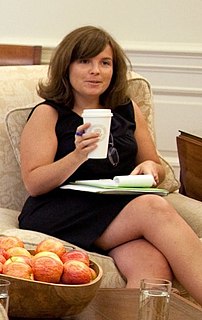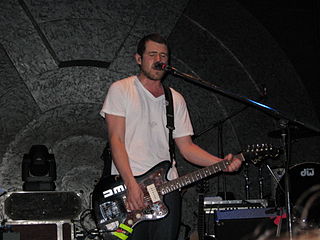A Quote by W. H. Auden
A writer, or at least a poet, is always being asked by people who should know better: “Whom do you write for?” The question is, of course, a silly one, but I can give it a silly answer. Occasionally I come across a book which I feel has been written especially for me and for me only. Like a jealous lover I don’t want anybody else to hear of it. To have a million such readers, unaware of each other’s existence, to be read with passion and never talked about, is the daydream, surely, of every author.
Quote Topics
About
Across
Always
Answer
Anybody
Anybody Else
Asked
Author
Been
Being
Better
Book
Come
Course
Daydream
Each
Else
Every
Existence
Feel
Give
Hear
Jealous
Jealous Love
Know
Least
Like
Lover
Me
Million
Never
Occasionally
Only
Other
Passion
People
Poet
Question
Read
Readers
Should
Silly
Surely
Talked
Unaware
Want
Which
Whom
Write
Writer
Written
Related Quotes
I would like to write a novel, or at least try to write one, although my motives are not entirely pure. For one thing, I get asked about writing novels so much that I feel guilty about never having written one. And although I have no strong desire to write a novel, I would hate not to try. That would just be silly. On the other hand, I hate the idea of slogging through something that turns out to be not good.
My theory about writing is that one should write books you'd like to read, but no one else has written yet. So, as long as I stick with that, I'm entertaining myself, and then hopefully my readers as well. I hope to god I realize that I'm repeating myself, if I ever do. But if I don't, I'm sure my readers will let me know.
Now, the question of the hour is, "Who's got the Pandorica?" Answer: I do. Next question: Who's coming to take it from me? Come on! Look at me! No plan, no back-up, no weapons worth a damn! Oh, and something else, I don't have anything to lose! So, if you're sitting up there in your silly little spaceship with all your silly little guns, and you've got any plans on taking the Pandorica tonight, just remember who's standing in your way! Remember every black day I ever stopped you, and then, and then, do the smart thing: Let somebody else try first.
I think that if you look at all of the books that have ever been written about people working in the White House, they're sort of the opposite of my book. And I think that so many people want to write a book that sort of memorializes their place in history. And I wanted to write something for all of the women who are like me. I grew up in upstate New York, I graduated high school with 70 other people and didn't ever know that anything like this would have really been an option for me. So I wanted other young women — and men — to know that just being you is plenty.
I never learned to be a writer. I never took screenwriting courses. I never read anyone's scripts. As a writer, my only guiding principle has been to write about things that scare me, write about things that make me feel vulnerable, write about things that will expose my deepest fears, so that's how I write.
I think that the whole idea of ‘no regrets’ was always a silly idea to me, because of course I regret all the places I went wrong, but that’s what creating anything, and being human, is all about. Of course if I could go back and knew what I know now, I absolutely would do it differently, I’d do it the right way, but part of being human is that we can’t go back, we can only hope that if we come across that moment again, we’ll do it the right way.
I have always been accused of taking the things I love – football, of course, but also books and records – much too seriously, and I do feel a kind of anger when I hear a bad record, or when someone is lukewarm about a book that means a lot to me. Perhaps it was these desperate, bitter men in the West Stand at Arsenal who taught me how to get angry in this way; and perhaps it is why I earn some of my living as a critic – maybe it’s those voices I can hear when I write. ‘You’re a WANKER, X.’ ‘The Booker Prize? THE BOOKER PRIZE? They should give that to me for having to read you.
Isn't it curious how one has only to open a book of verse to realise immediately that it was written by a very fine poet, or else that it was written by someone who is not a poet at all. In the case of the former, the lines, the images, though they are inherent in each other, leap up and give one this shock of delight. In the case of the latter, they lie flat on the page, never having lived.
When I was young I was on punishment a lot and I used to watch a lot of TV, and I asked myself a question: 'How come people like Mike? How come they like Magic? How come they like Bird? How come they don't like the big guys?' So I just throw a little bit of what they were doing. You smile, you act crazy and silly. And I think people like me because I'm different. I've always been a class clown type of guy. It comes natural.
He was not such a special person. He loved to read very much, and also to write. He was a poet, and he exhibited me many of his poems. I remember many of them. They were silly, you could say, and about love. He was always in his room writing those things, and never with people. I used to tell him, What good is all that love doing on paper? I said, Let love write on you for a little. But he was so stubborn. Or perhaps he was only timid.
I had a question asked of me the other day, and this is asked of me a lot, surprisingly. 'Is there anything you want that you can't have?' And I said, 'Of course! What kind of question is this? Of course there is.' There's any number of things that I would like to have that I either can't afford or it doesn't make sense to buy. You know, I'd love to have world peace.







































